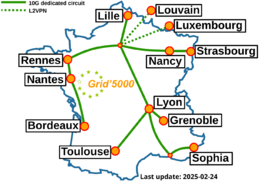Grid5000:Home
|
Grid'5000 is a precursor infrastructure of SLICES-RI, Scientific Large Scale Infrastructure for Computing/Communication Experimental Studies.
|
|
Grid'5000 is a large-scale and flexible testbed for experiment-driven research in all areas of computer science, with a focus on parallel and distributed computing, including Cloud, HPC, Big Data and AI. Key features:
Older documents:
|
Random pick of publications
Five random publications that benefited from Grid'5000 (at least 2937 overall):
- Diego Amaya-Ramirez. Data science approach for the exploration of HLA antigenicity based on 3D structures and molecular dynamics. Bioinformatics q-bio.QM. Université de Lorraine, 2024. English. NNT : 2024LORR0071. tel-04708399 view on HAL pdf
- Emmanuel Medernach, Gaël Vila, Axel Bonnet, Sorina Camarasu-Pop. ReproVIP Report #2.1.1 Application Deployment Strategies. CREATIS Université Lyon 1. 2024. hal-04551771 view on HAL pdf
- Barbara Gendron, Gaël Guibon. SEC: Context-Aware Metric Learning for Efficient Emotion Recognition in Conversation. Proceedings of the 14th Workshop on Computational Approaches to Subjectivity, Sentiment, & Social Media Analysis (WASSA at ACL 2024), Aug 2024, Bangkok, Thailand. hal-04702997 view on HAL pdf
- Lucian Trestioreanu, Flaviene Scheidt, Wazen M. Shbair, Jerome Francois, Damien Magoni, et al.. To Squelch or not to Squelch: Enabling Improved Message Dissemination on the XRP Ledger. 37th IEEE/IFIP Network Operations and Management Symposium (NOMS 2024), May 2024, Séoul, South Korea. hal-04621124 view on HAL pdf
- Mostafa Sadeghi, Romain Serizel. Posterior sampling algorithms for unsupervised speech enhancement with recurrent variational autoencoder. International Conference on Acoustics Speech and Signal Processing (ICASSP), IEEE, Apr 2024, Seoul (Korea), South Korea. 10.48550/arXiv.2309.10439. hal-04210679v2 view on HAL pdf
Latest news
![]() Cluster Sasquatch is now in default queue at Grenoble
Cluster Sasquatch is now in default queue at Grenoble
We are pleased to announce that the Sasquatch [1] cluster is now available in the default queue.
Sasquatch is a cluster composed of 2 HPE RL300 nodes, each featuring:
This cluster was funded by the PEPR IA.
[1] https://www.grid5000.fr/w/Grenoble:Hardware#sasquatch
[2] https://amperecomputing.com/briefs/ampere-altra-family-product-brief
Best regards, Grid'5000 Technical Team
-- Grid'5000 Team 10:15, 11 February 2026 (CEST)
![]() Cluster Spirou is now in default queue at Louvain
Cluster Spirou is now in default queue at Louvain
We are pleased to announce that the Spirou[1] cluster of the newly installed Louvain site is now available in the default queue.
Spirou is a cluster composed of 8 Lenovo ThinkSystem SR630 V2 nodes, each featuring:
Be aware that we noticed I/Os inconsistencies on this cluster.
We advise users to take this into account when performing experimentations on the cluster. See the following bug for more information: https://intranet.grid5000.fr/bugzilla/show_bug.cgi?id=16938
This cluster was funded by the Fonds de la Recherche Scientifique – FNRS (F.R.S.–FNRS), and its operation is supported by F.R.S.–FNRS and the Wallonia region (SPW).
[1] https://www.grid5000.fr/w/Louvain:Hardware#spirou
Best regards,
Grid'5000 Technical Team
-- Grid'5000 Team 10:24, 12 January 2026 (CEST)
![]() End of support for centOS7/8 and centOSStream8 environments
End of support for centOS7/8 and centOSStream8 environments
Support for the centOS7/8 and centOSStream8 kadeploy environments is stopped due to the end of upstream support and compatibility issues with recent hardware.
The last version of the centOS7 environments (version 2024071117), centOS8 environments (version 2024071119), centOSStream8 environments (version 2024070316) will remain available on /grid5000. Older versions can still be accessed in the archive directory (see /grid5000/README.unmaintained-envs for more information).
-- Grid'5000 Team 08:44, 4 December 2025 (CEST)
![]() Ecotaxe cluster is now in default queue at Nantes
Ecotaxe cluster is now in default queue at Nantes
We are pleased to announce that the ecotaxe cluster of Nantes is now available in the default queue.
As a reminder, ecotaxe is a cluster composed of 2 HPE ProLiant DL385 Gen10 Plus v2 servers[1].
Each node features:
To submit a job on this cluster, the following command may be used:
oarsub -t exotic -p ecotaxe
This cluster is co-funded by Région Pays de la Loire, FEDER and REACT EU via the CPER SAMURAI [3].
[1] https://www.grid5000.fr/w/Nantes:Hardware#ecotaxe
[2] The observed throughput depends on multiple parameters such as the workload, the number of streams, ... [3] https://www.imt-atlantique.fr/fr/recherche-innovation/collaborer/projet/samurai
-- Grid'5000 Team 14:10, 02 December 2025 (CET)
Grid'5000 sites
Current funding
INRIA |
CNRS |
UniversitiesIMT Atlantique |
Regional councilsAquitaine |



